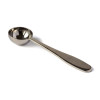Here are the technical characteristics of this spoon designed to enhance your experience:
| Feature |
Value |
| Quality |
Premium |
| Primary use |
Measure the perfect quantity of tea leaves |
| Target audience |
Tea enthusiasts |
| Dosage |
One filled spoon = perfect dose for one cup |
| Design |
Elegant |
| Ease of use |
Optimal |
| Benefit |
Transforms the tea experience |
Precision in the service of your senses
Every gesture counts in the art of tea. This measuring spoon guides you toward perfect accuracy, the kind that reveals the subtle balance between strength and delicacy. Not too much, not too little: just what's needed for each infusion to fully express its character.
A daily companion designed to last
Crafted with the precision of master artisans, this spoon quickly becomes a natural extension of your hand. Its elegant design harmonizes perfectly with your other tea accessories, creating a visual coherence that contributes to the pleasure of tasting.
Simplicity at the heart of excellence
Its remarkable ease of use allows every enthusiast, beginner or connoisseur, to instantly master the right dosage. No more hesitation: one heaping spoonful corresponds exactly to the perfect dose for one cup, transforming each preparation into a moment of serenity.
Why choose this measuring spoon
- Guaranteed precision: Each spoonful delivers the ideal quantity to reveal all the aromas
- Premium quality: Designed to withstand time and daily use
- Timeless elegance: A design that harmoniously integrates into your ritual
- Ease of use: Accessible to all levels of expertise
- Transformed experience: Rediscover the pleasure of preparing your tea
The art of the right measure
In the world of tea, measurement is not just a technical matter: it's a gesture imbued with respect for the leaf and consideration for the person who will taste it. This spoon invites you to slow down, to become aware of each movement, to feel the weight of the leaves gently sliding.
Whether you're preparing a delicate green tea with vegetal notes, a full-bodied black tea with malty accents, or a soothing herbal infusion, this spoon adapts to all your tasting moments. It becomes the link between your tea leaves and your cup, guaranteeing the perfect balance every time.
An investment in your daily pleasure
Choosing this tea measuring spoon means choosing consistency in excellence. No more approximations that spoil a beautiful harvest, no more infusions that are too weak or too strong. With this utensil by your side, every cup becomes a promise kept.
For all tea lovers
Whether you're just discovering the fascinating world of tea or you're a seasoned connoisseur, this spoon naturally finds its place in your kitchen. It accompanies both your taste explorations and your well-established rituals, adapting to your rhythm and preferences.
A gift that makes sense
Offering this spoon means transmitting the love of the right gesture and the present moment. It's inviting someone to discover or rediscover the simple yet profound pleasure of a perfectly measured cup of tea. A gift that speaks of kindness and attention to the details that matter.
Frequently asked questions
Is this spoon suitable for all types of tea?
Absolutely. Whether it's loose leaf teas, flavored blends or herbal infusions, this spoon adapts to all textures and leaf densities.
How do I maintain my measuring spoon?
A simple rinse with clear water after use is sufficient. To preserve its beauty, avoid abrasive products and dry it gently.
Can I use it for other preparations?
Although specifically designed for tea, this spoon can also be used to measure other fine ingredients such as spices or aromatic herbs.
Is the capacity suitable for large teapots?
This spoon measures perfectly for one cup. For a family teapot, simply multiply the number of spoonfuls according to the number of cups desired.
Join the community of informed enthusiasts
By choosing this tea measuring spoon, you join a community of enthusiasts who have understood that the greatest pleasures often arise from the simplest gestures. You will discover how a well-designed accessory can transform your relationship with tea, inviting you to fully savor every moment of tasting.
Let yourself be guided by this spoon toward a new dimension of your passion for tea. Order now and treat yourself to the pleasure of the right measure, the one that reveals all the beauty of your favorite teas.
Transform your tea ritual today - Your palate will thank you for this delicate attention that makes all the difference between a simple beverage and a true moment of happiness.









